"Sure, I am holding on, but Vasya has died. I recognized him by his hand."
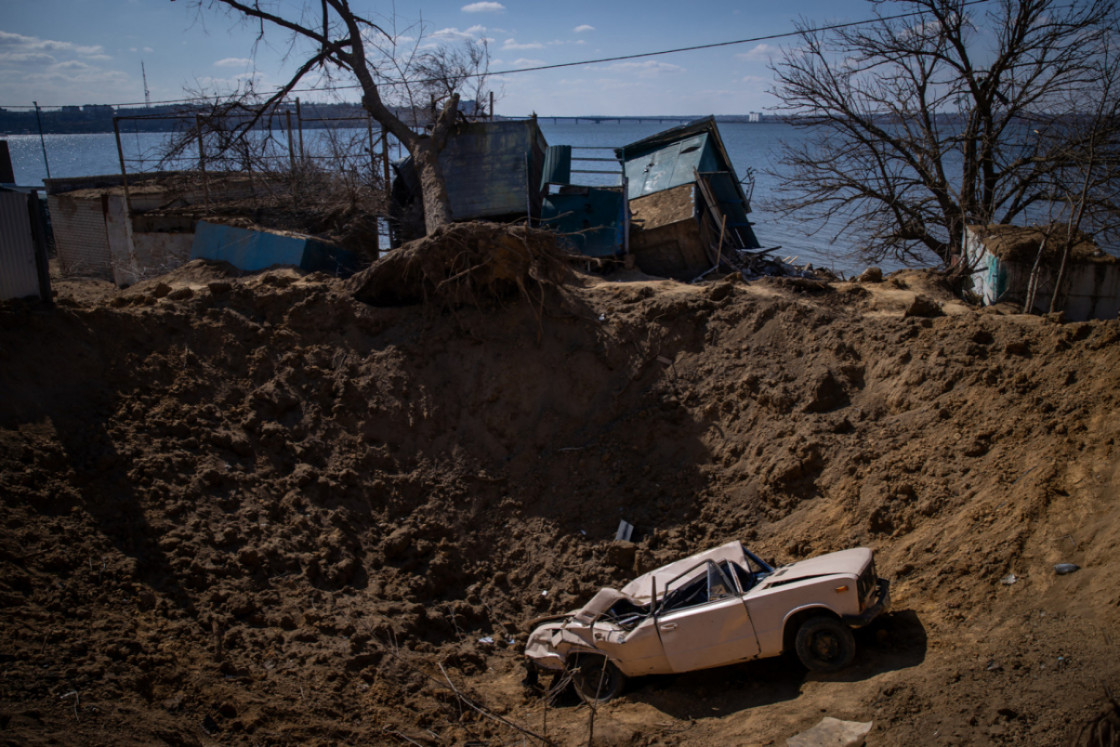
In the war Russia started against Ukraine almost a month ago, a barracks in Mykolayiv was the site of one of the rocket attacks with the highest number of casualties so far. While the rescue efforts were still underway among the rubble, the identification of the freshly recruited young and middle-aged soldiers had also begun. In spite of all, the city is holding on, even though both the city and the area around it have been subjected to numerous attacks. The majority of the population are Russian-speakers, but they want nothing to do with Putin, who claims that they need to be saved from Ukrainian nationalists. Translation by Andrea Horváth Kávai
“Vasya died. I recognized him from his hand…his tattoo.” – the tattoo stands for the first letter of his wife, Veronika’s name. Following the identification, the woman, in her fifties, stands calmly at the morgue. She only breaks down when a relative of hers calls on the phone: “Of course, sure, I'm holding on, what else could I do?” – she says, crying.
But she pulls herself together quickly, as there are papers to sign, and a funeral to be arranged for her husband, who died in the rocket attack on the Mykolayiv barracks on Friday morning. According to yet unconfirmed reports, more than a hundred are feared to have been killed. Vasya had been drafted a few days prior, and there was no question about whether he should join.
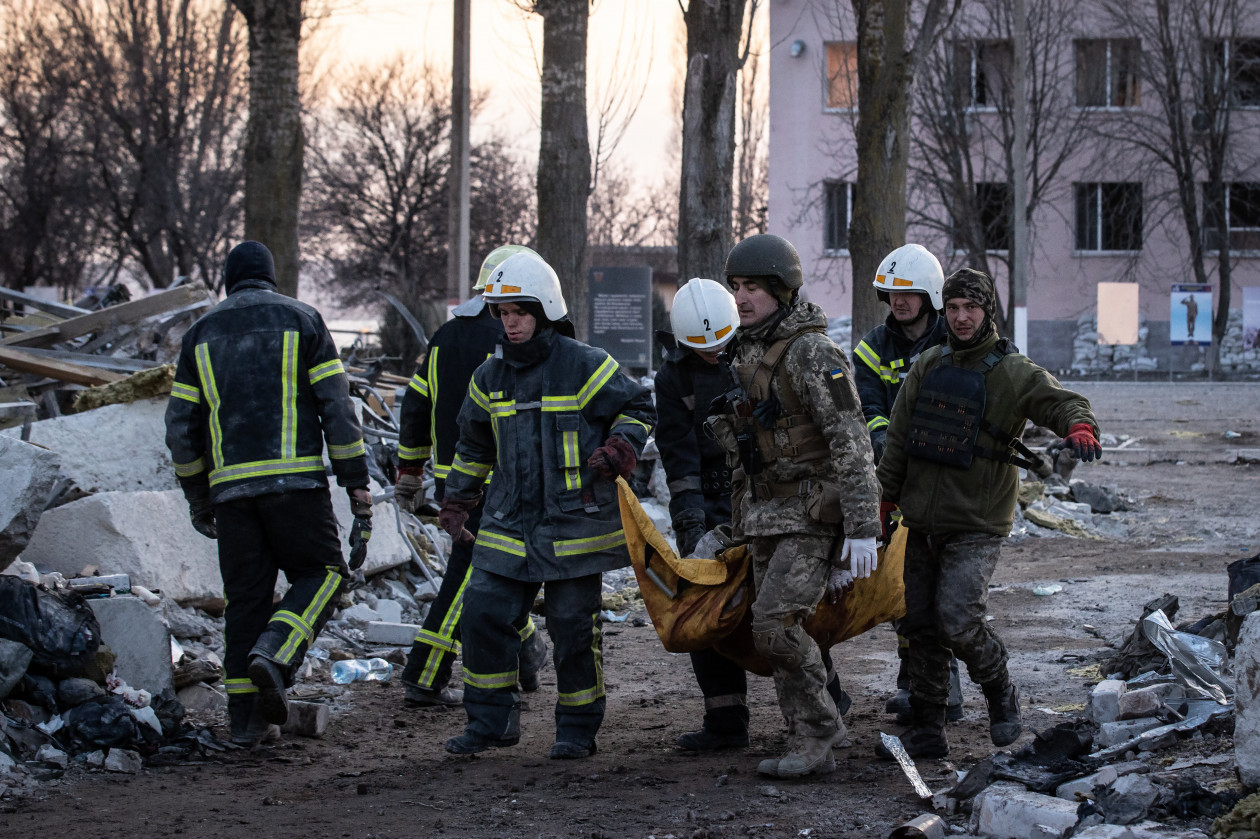
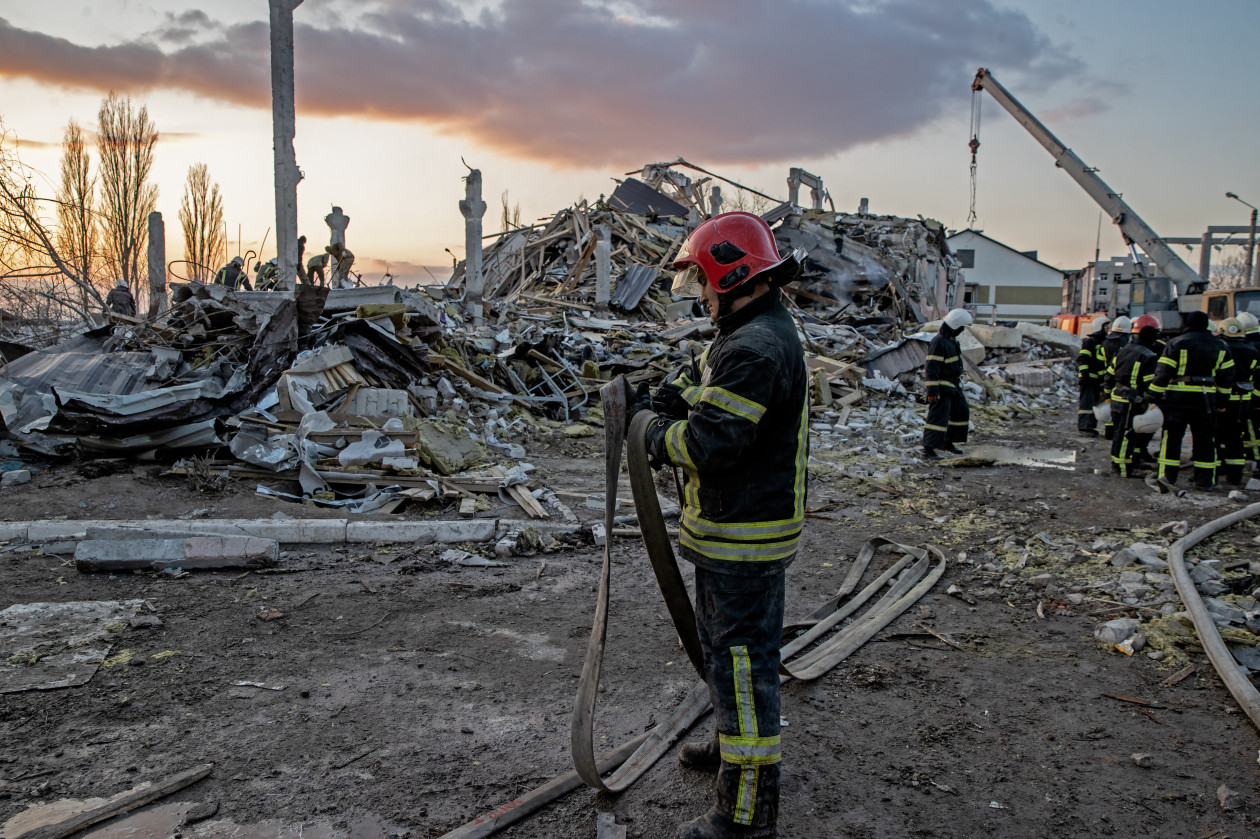
Veronika’s younger son is helping her take care of the official details at the morgue. The older son died recently. He was working in Poland, and suddenly fell ill. He was coughing and had difficulty breathing. “I don’t know what happened. They examined him and said it was not Covid. I dreamt about Igor two days ago. He was sitting by his grave, smoking one cigarette after the other. And look, now after Igor, Vasya is gone as well.”
Using what's left to identify victims
Veronika works in a hotel. Her husband was a mechanic. She is a fragile, thin woman, but she stays strong as she handles all the paperwork. When saying goodbye, she even thinks to tell me that she would inform me once the time of the funeral had been set.
The victims’ bodies are lined up in the building to the side of the yard. Due to the destructive force of the missile attack, identification is not easy – the pathologists are working on taking samples from the corpses. Their looks are glazed as they go back and forth between the corpses in the yard and the pathology building. One of them buries his head in his hands as he comes back to the yard again. He turns around, looks underneath one of the black body bags on the ground, then goes back in.
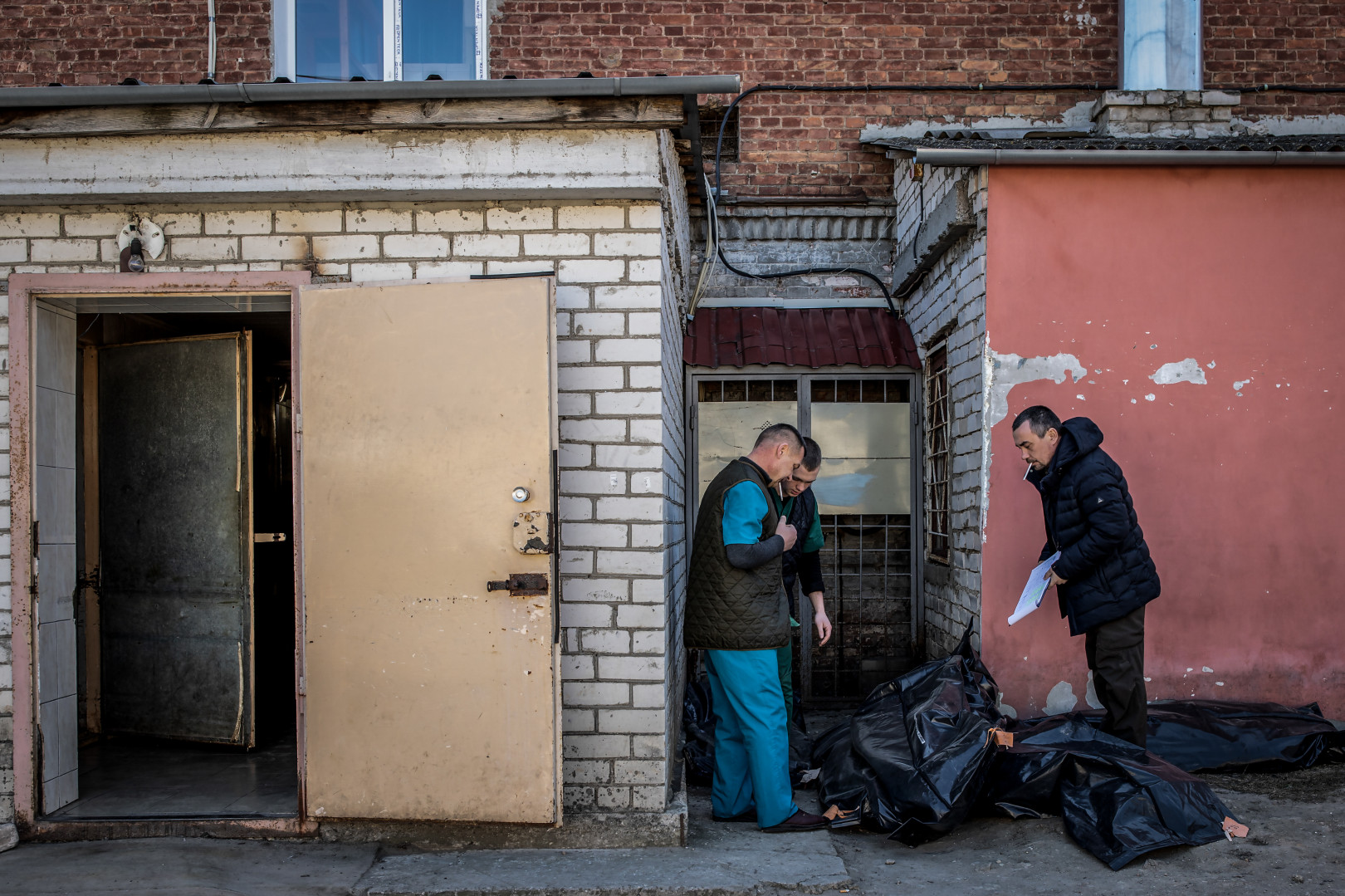
Meanwhile a new delivery truck arrives – even a day later, they are still finding more victims. A soldier standing a bit further away says he’s heard that they have already brought in 80 victims, but they are not giving out an official number as long as the rescue operation is still ongoing. The spokesman of the military says that the press is throwing around all kinds of numbers, but they won’t say anything until they have all the data. Maybe tomorrow.
The only good news is a miraculous escape: 30 hours after the attack, they found a survivor under the rubble.
The city has been under Russian military pressure and incessant rocket attacks since 7 March. A week ago, a Smerch rocket killed nine civilians, while they waited in line in front of a store. A few more rockets hit other parts of the residential area, breaking the windows almost everywhere. The residential neighbourhood is but a few minutes’ walk from the barracks, but it is not very likely that the military building was the target at the time: the rocket used on the barracks was much more powerful.
The Smerch rockets used on the residential area are less suitable for destroying buildings, but more capable of taking human life – due to the hundreds of pieces of metal they contain. A similar attack was done against another neighbourhood of the town, which boasted half a million inhabitants before the war.
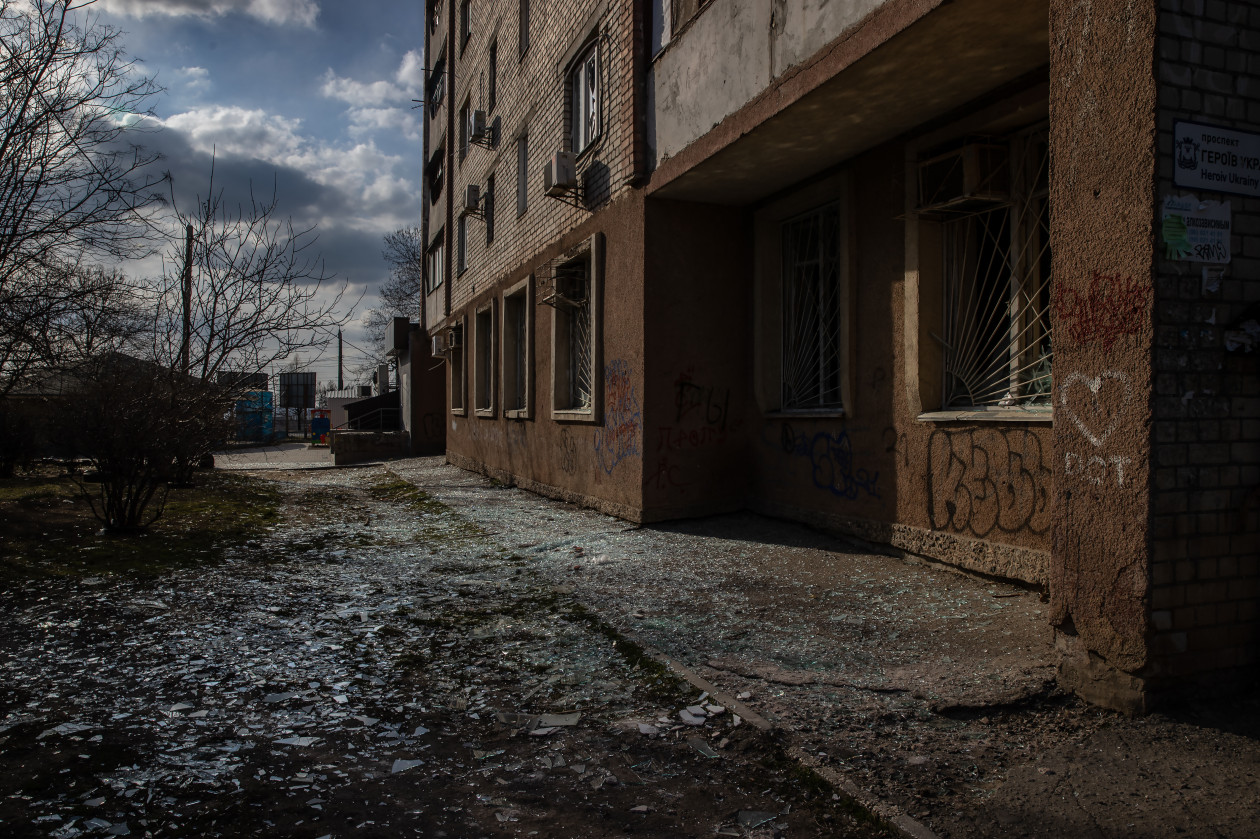
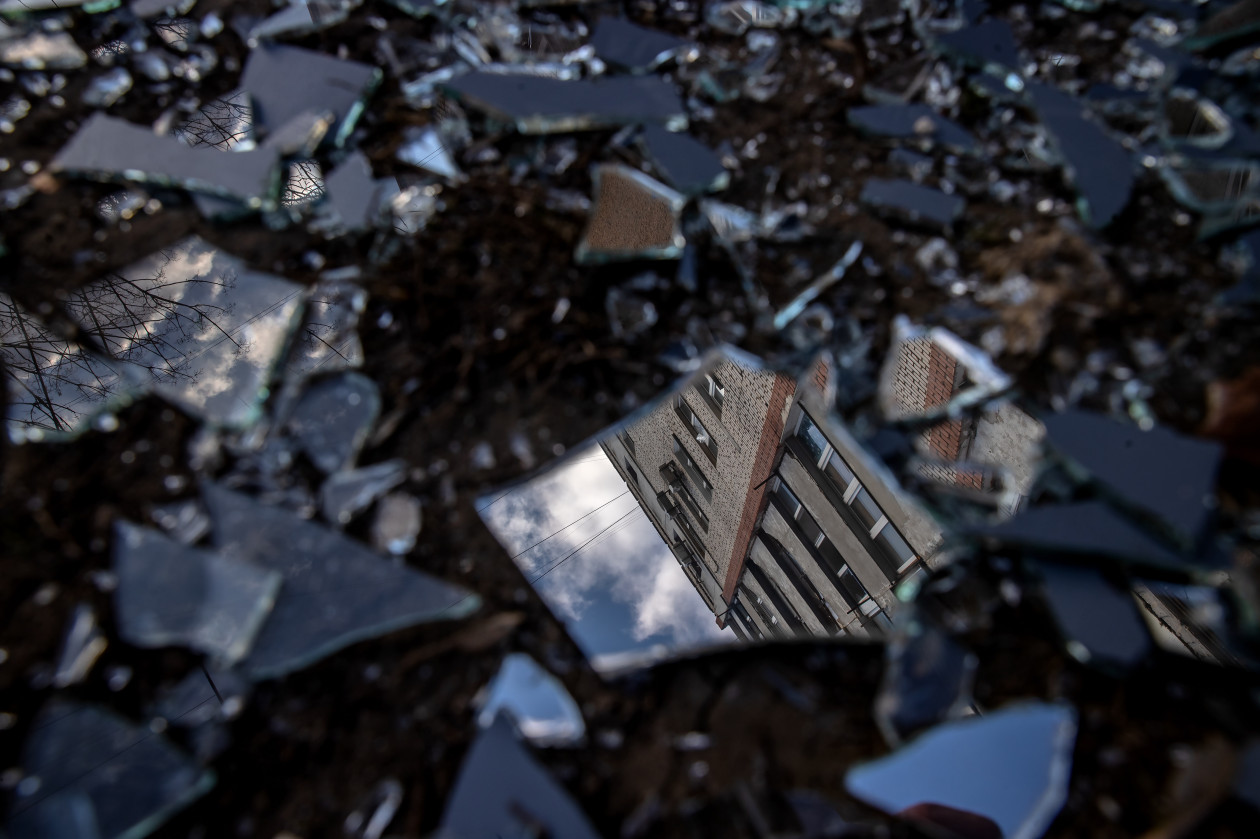
Compared to the area around it, Mykolaiv is a place of refuge
Following the attacks on Friday, there were explosions on Saturday as well – although mostly the sound of air defense could be heard, and there were no news about more direct hits. The air-raid sirens sounded on Saturday morning. This, however, did not cause much of a stir where we were staying. Only a seven-year old girl ran to her mother to warn her. A few people moved to the dark hallway, but in the end, they also went back to their rooms.
Many of them are from the surrounding villages: from Pribuzke in the South-East, and Bastanka in the North-East. The danger of attacks is higher over there, as the Russian forces keep getting closer – and even though they haven’t been able to take Mykolaiv, the danger of rocket attacks is still a very present threat.
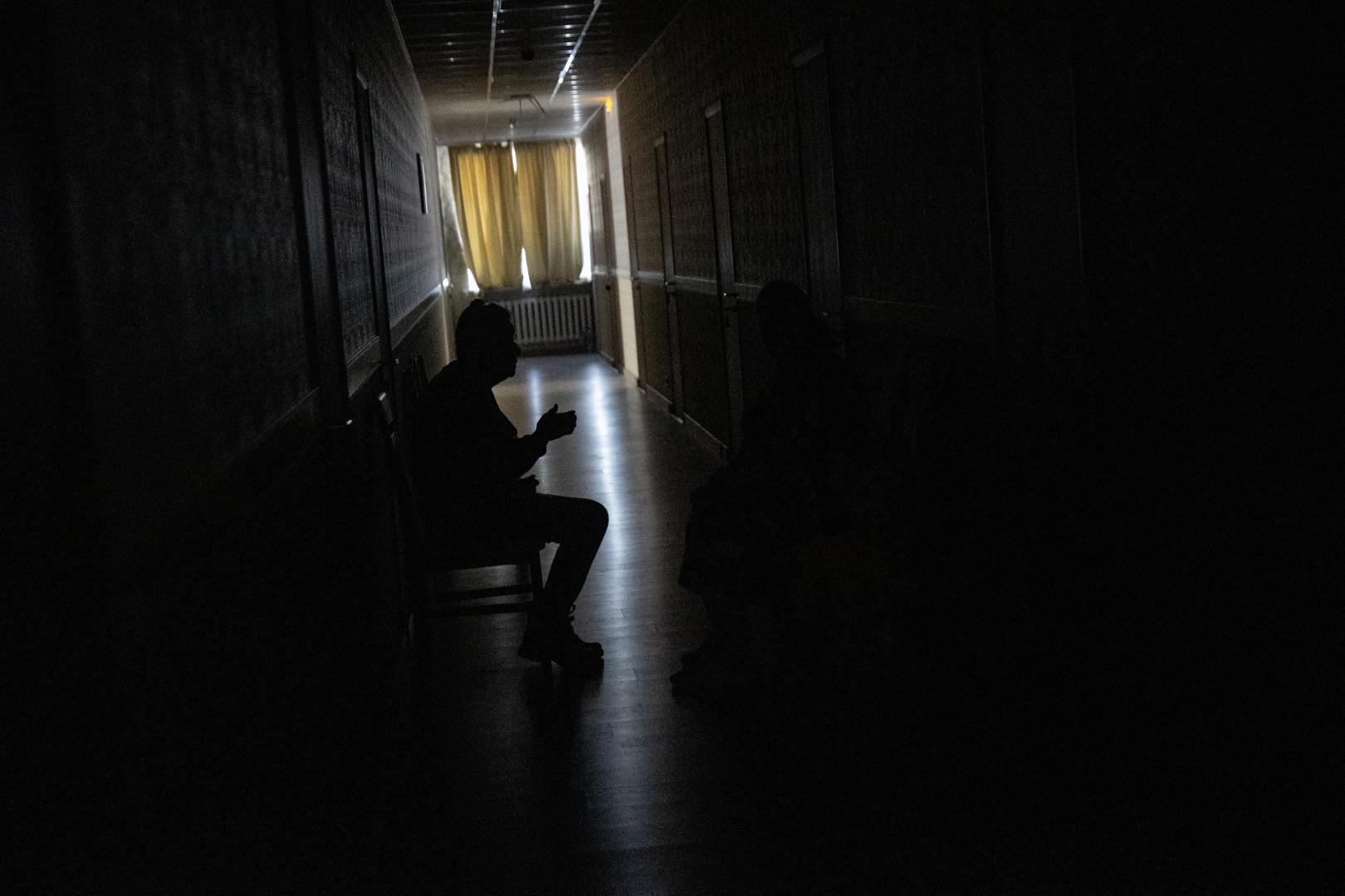
“My grandfather was born near the Ural mountains. He was the 17th child in their family. Nine grew to adulthood, so his siblings have many children. I have lots of relatives there. My mother is Ukrainian, and I grew up here, in Mykolayiv. My grandfather would be turning in his grave if he knew that some of the grandkids from Russia have attacked his Ukrainian grandchildren. It would also break his heart to know that part of the family has sought refuge in Germany from these Russian grandkids.” – a man at the hotel told us, as he held his kitten.
He said that just like many Russian-speaking Ukrainians, he doesn’t speak with the relatives in Russia any more. They simply don’t understand. They don’t believe what he is telling them, and he doesn’t want to hear them spouting Russian propaganda, which claims that Ukrainians are shooting at Ukrainians, and that the Russian-speakers are thankful that the Russian army finally showed up. “I don’t need anyone to save me. No one ever gave me a hard time for speaking Russian. They should just leave us alone.”
It wasn’t easy before the war either
Ternivka is on the northern side of Mykolayiv. This part of the city has a village feel to it, and even in peaceful times it boasted both new and modern, and older, simpler homes. Some parts of the neighbourhood have received direct hits, leveling several houses. People are still inhabiting the houses which are standing – next to those which have been completely destroyed.
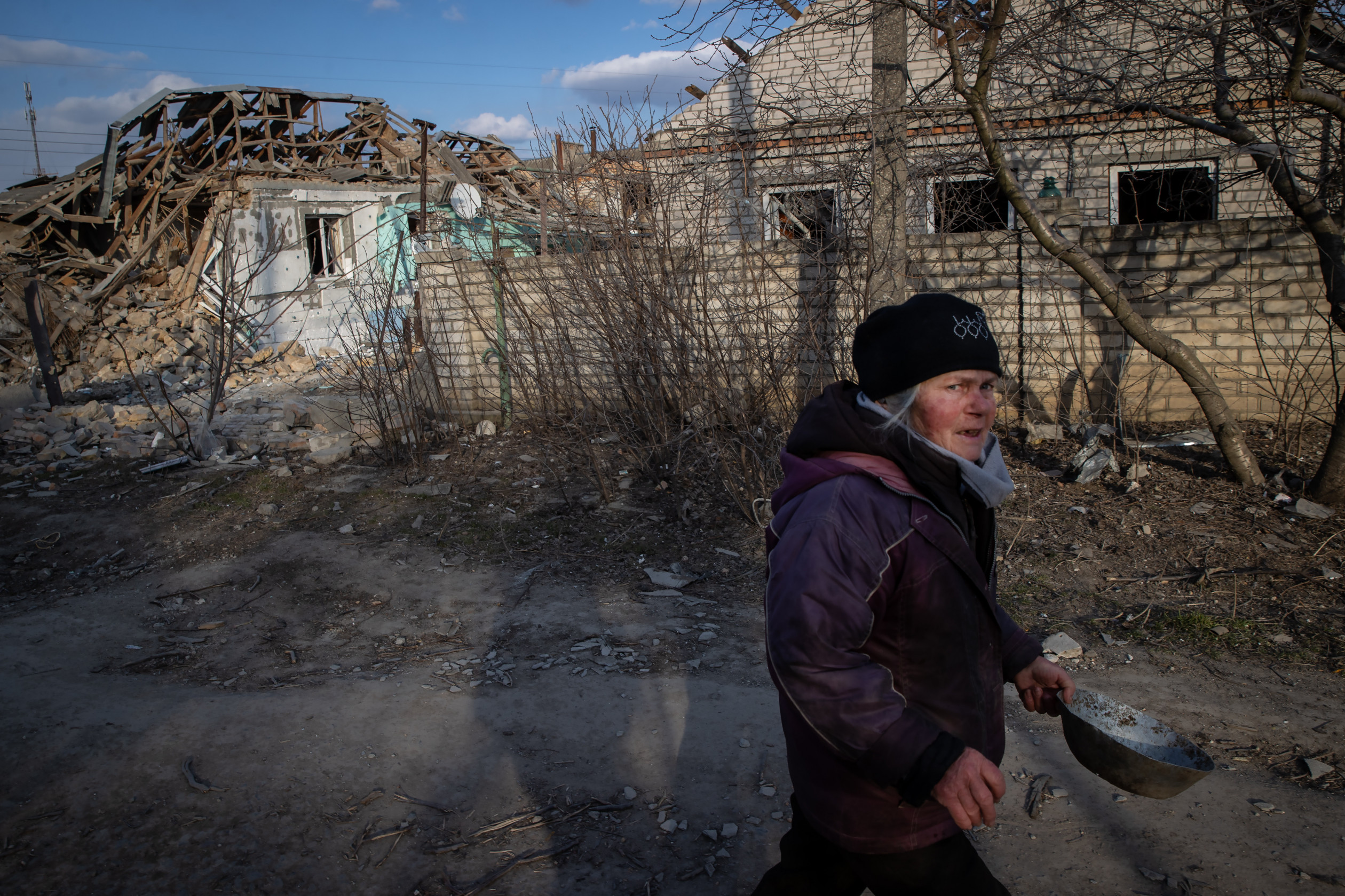
In fact, some people specifically fled here. Aleksandr and Margarita came to grandma’s house with their 16-year old daughter following a rocket attack which smashed all the windows of their apartment in a housing estate. Grandma’s house at least has a cellar, so that is where they went. It was shortly after their arrival that a rocket hit the neighbouring houses.
“Where could we go? We are staying here” – says Margarita, spreading her arms wide in the dark room. The room is dark because they used wood fibre boards to cover up the broken windows. They have no savings, and are not receiving any humanitarian aid. They are living off of grandma’s two thousand hrivnya (approximately 75 euros before the war) pension, and Margarita’s five thousand hrivnya (approximately 185 euros before the war) salary which she earns with cleaning. She used to work as a seamstress, but lost her job before the war broke out, and because of the war, she doesn’t have any private orders either. Her husband lost his job too.
„From these seven thousand hrivnyas, up to five thousand are spent on the heating in winter. So we can’t even stock up on potatoes. Two years ago we were able to do that, but now we couldn’t afford that even in December. And then this war came. “
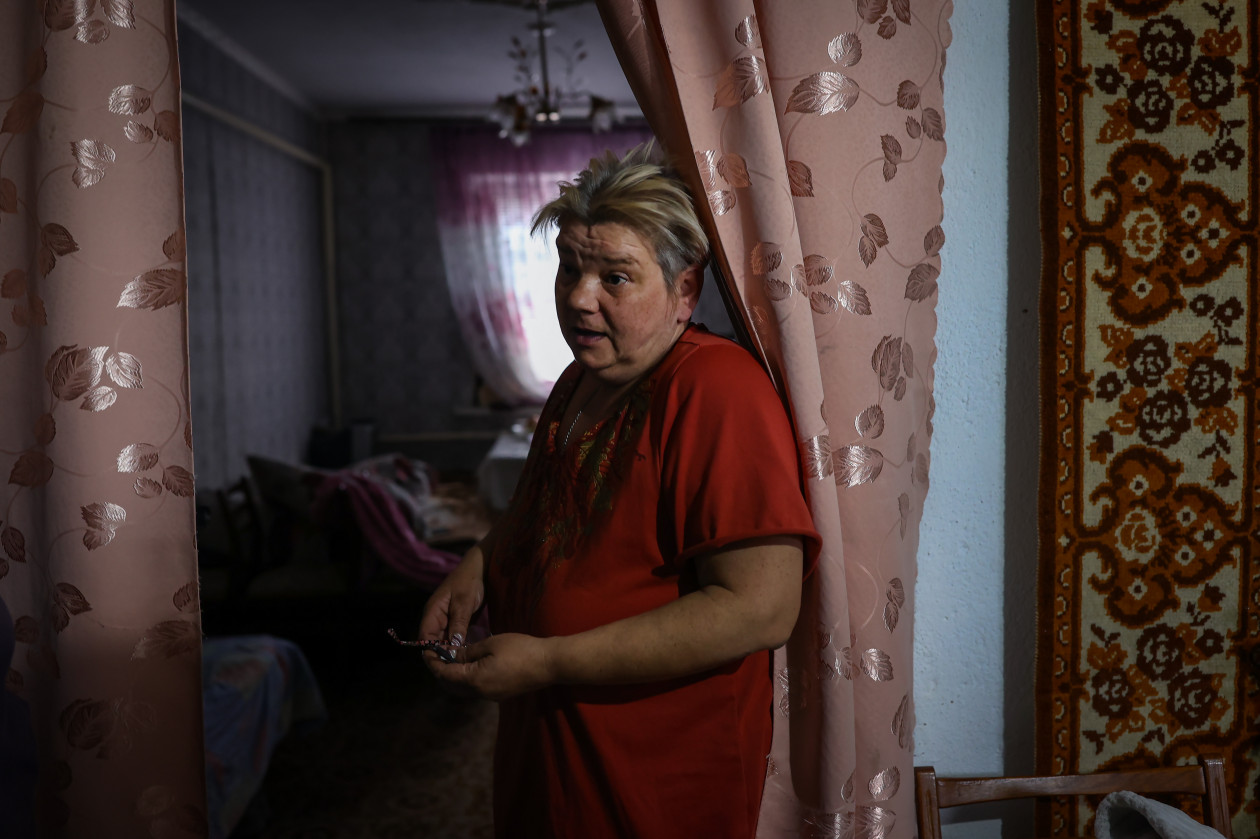
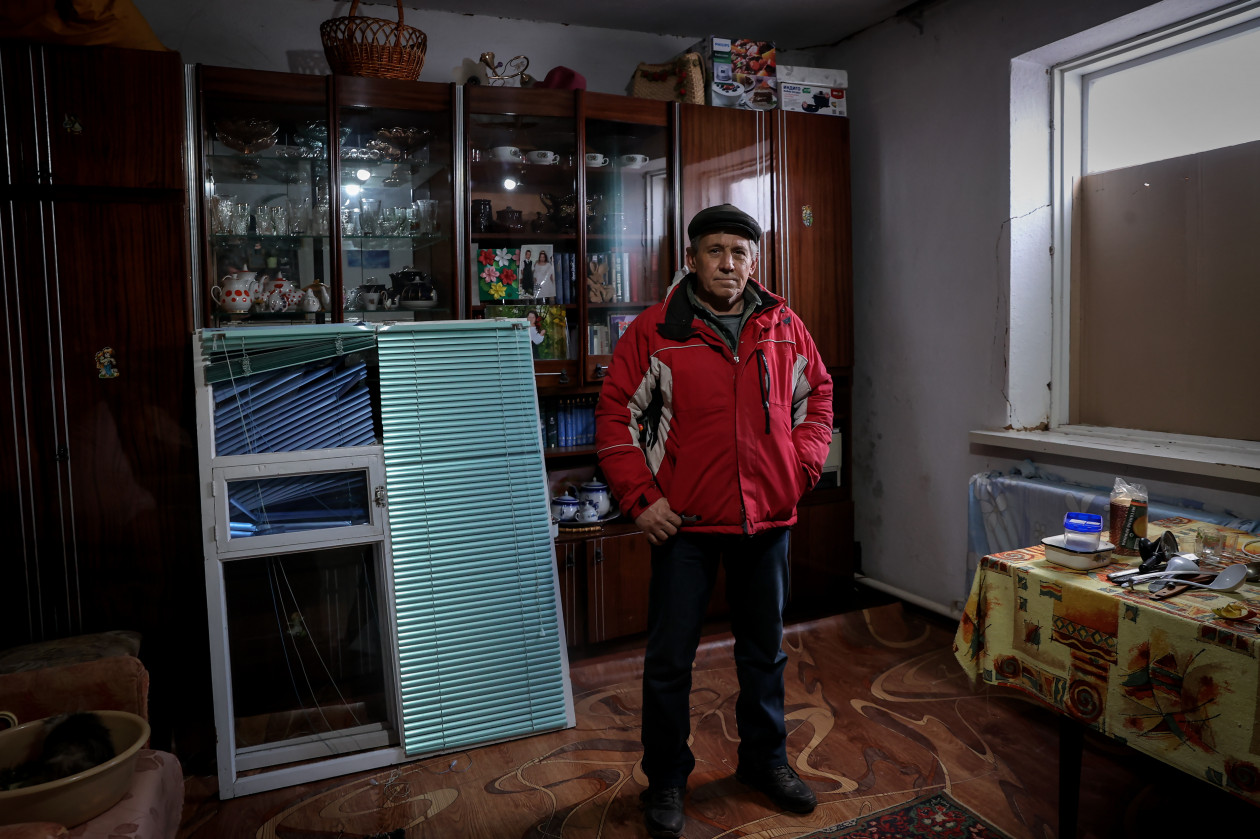
Three kilometres can be very far
Margarita is also angry at Putin for claiming that the Russian-speakers need to be saved. “I speak Russian too! Although I am Moldovan, even according to my citizenship. But I also have Poles among my ancestors, just like my husband. So what am I? Who cares? These things are not that easy to separate.” Although her husband and daughter are Ukrainian citizens, Dasha’s mother tongue is Russian – which doesn’t mean that she considers herself Russian. She isn’t really looking to answer the question either. Since she is one year away from graduating from high school, she is much more concerned about no classes being held currently. It is highly likely that because of the war, her generation will have to repeat the year altogether.
Ternivka is right on the edge of Mykolayiv. The next settlement is Kapustine. But the three kilometres separating them seem like much more.
At the checkpoint, a Russian tank decorated with the letter “Z” wass being pulled over when we were there – they had gotten ahold of it nearby, a few days before. It was another proof of the Russian losses and the fact that most of the Russian soldiers sent to Ukraine were not equipped with the most recent equipment.
On the other side of the checkpoint begins a long, wide, silent stretch of highway. While on it, one quickly realizes that it’s better to step on the gas pedal before the lonely car catches someone’s eye.
Staying is dangerous, but leaving is more dangerous
Rolling into Kapustine via the narrow space between the barricade of tyres is quite a relief. The village used to have 500 tenants, now there are 150 left. The others have either fled or have gone to fight. At the time of our arrival, the locals had gathered in front of the mayor’s office, waiting for humanitarian packages to be handed out. Yoghurt, cheese, onions, pasta, some bread. There was no pushing, everyone was called by name, and there was enough for all.
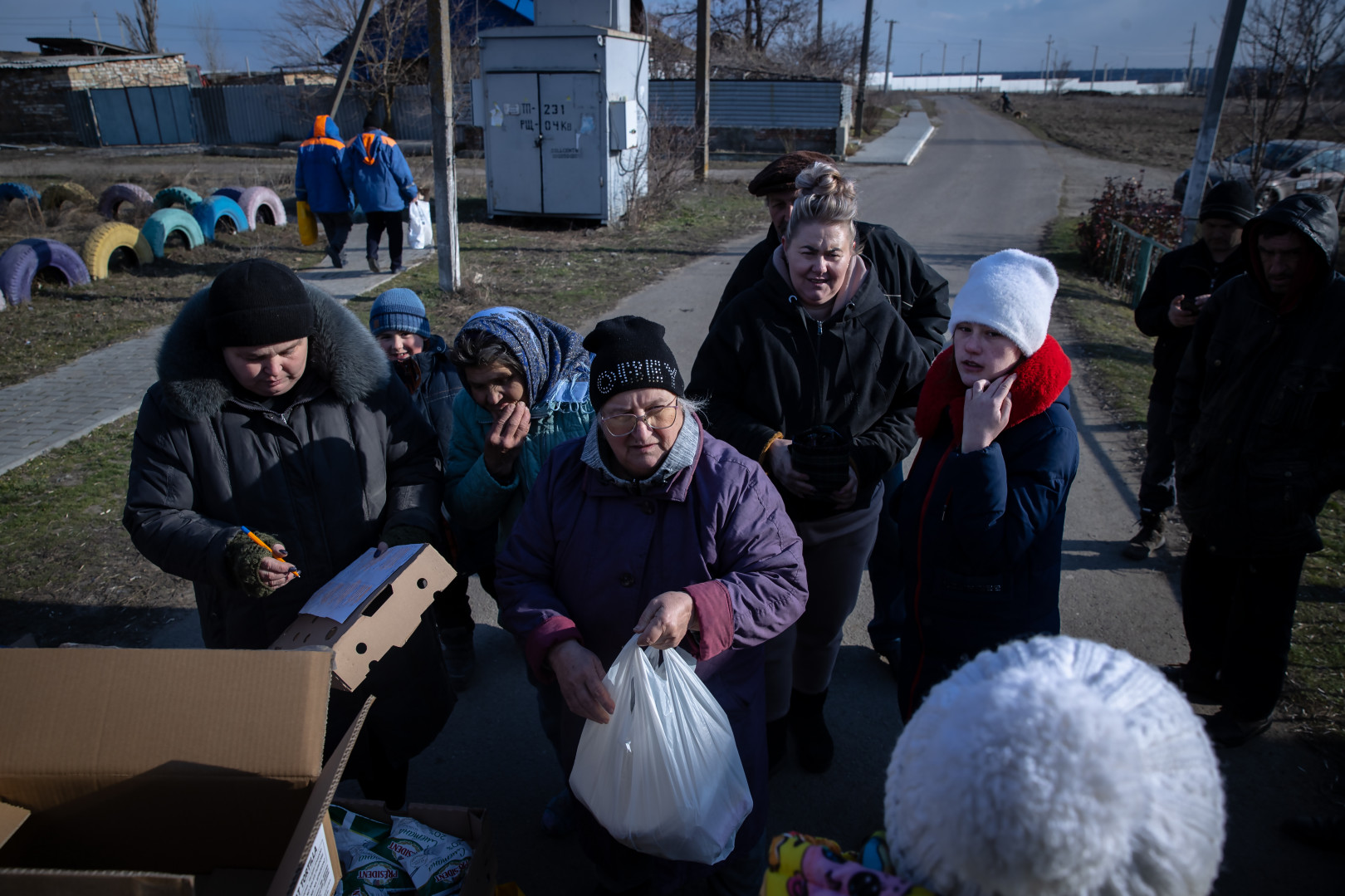
“Tanya, have you heard? Zhenya died!’” – informs Leonid one of his neighbours. Tanya is unsure which Zhenya he means, but then she remembers the young man who was a little red-headed guy not too long ago. He had signed up to fight, and died at Mariupol – the city on the coast of the Sea of Azov, which has been hardest hit in the war started by Russia, and is currently still under siege. Zhenya is the second soldier the village had lost.
They have had some civilian deaths as well, as several houses had been hit in the shelling. Thankfully, most of the houses were already empty, but one man is still in hospital, being treated with serious burn injuries. “There on the horizon, that is where the tanks used to be. They would start shooting at 4 am, and they kept it up until our guys chased them away.” – Leonid tells me as we stand next to a crater caused by the shelling in the back of his garden.
He worked as a driver as long as he could. Now he is unemployed. The fiftysomething has become the joint representative of the village, he is taking care of the distribution of the aid packages. The construction of the barricades from tyres was also organized by him.
It hasn’t occurred to him to leave the village, and the others who have stayed agree: “Where would we go, son?” – says a woman, sitting next to a crater created by a previous hit. Even though it’s only 2 degrees Celsius, she came out to join the others and enjoy the sunshine. “Some have gone into the city, but then returned in the end. One can hide more easily here” – adds the woman sitting next to her.
Putin has made everyone Ukrainian
Indeed, even escaping is not always safe. Leonid’s brother-in-law is currently in hospital, as his car was shot at while they were driving towards Mykolayiv. “It’s not too serious, he’ll live” – he says. He was about to wave his hand, but then he heard the sound of a helicopter in the distance. “We should probably hide” – he said, but then the sound faded.
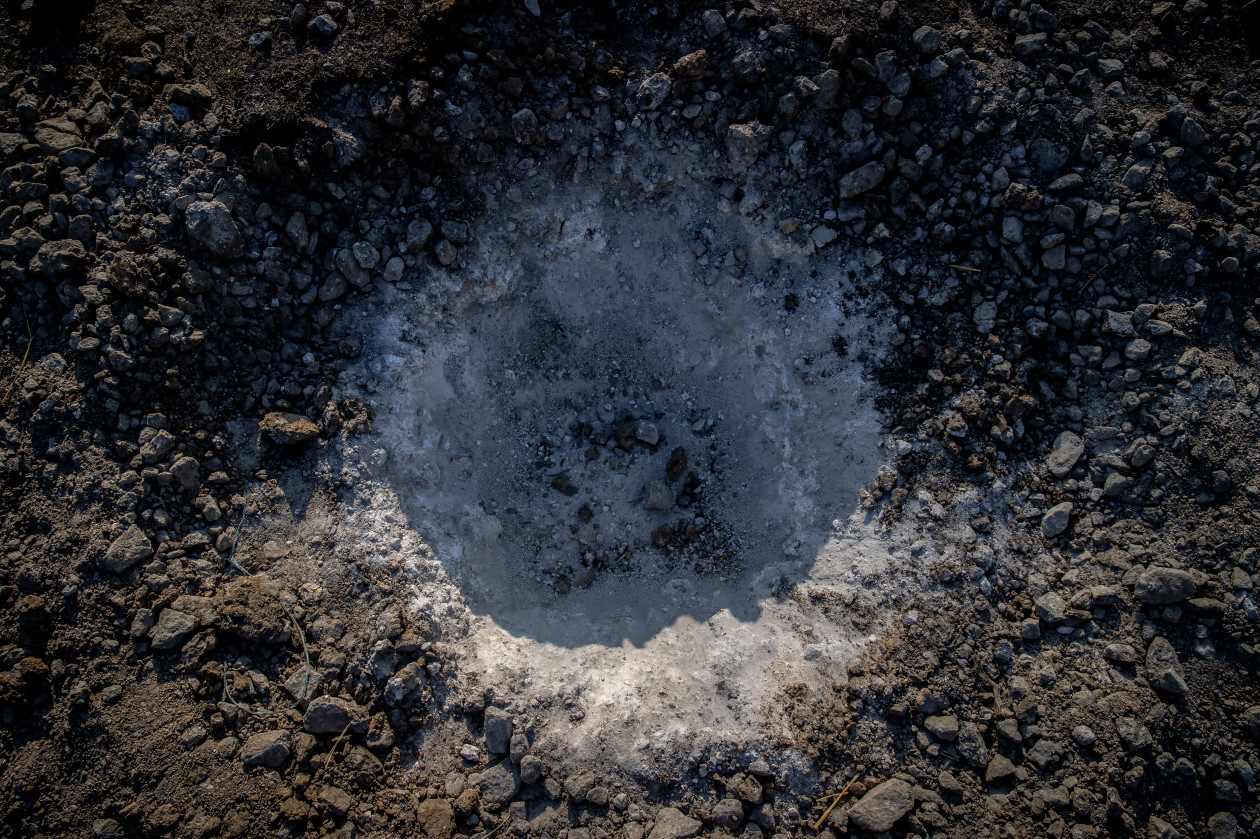
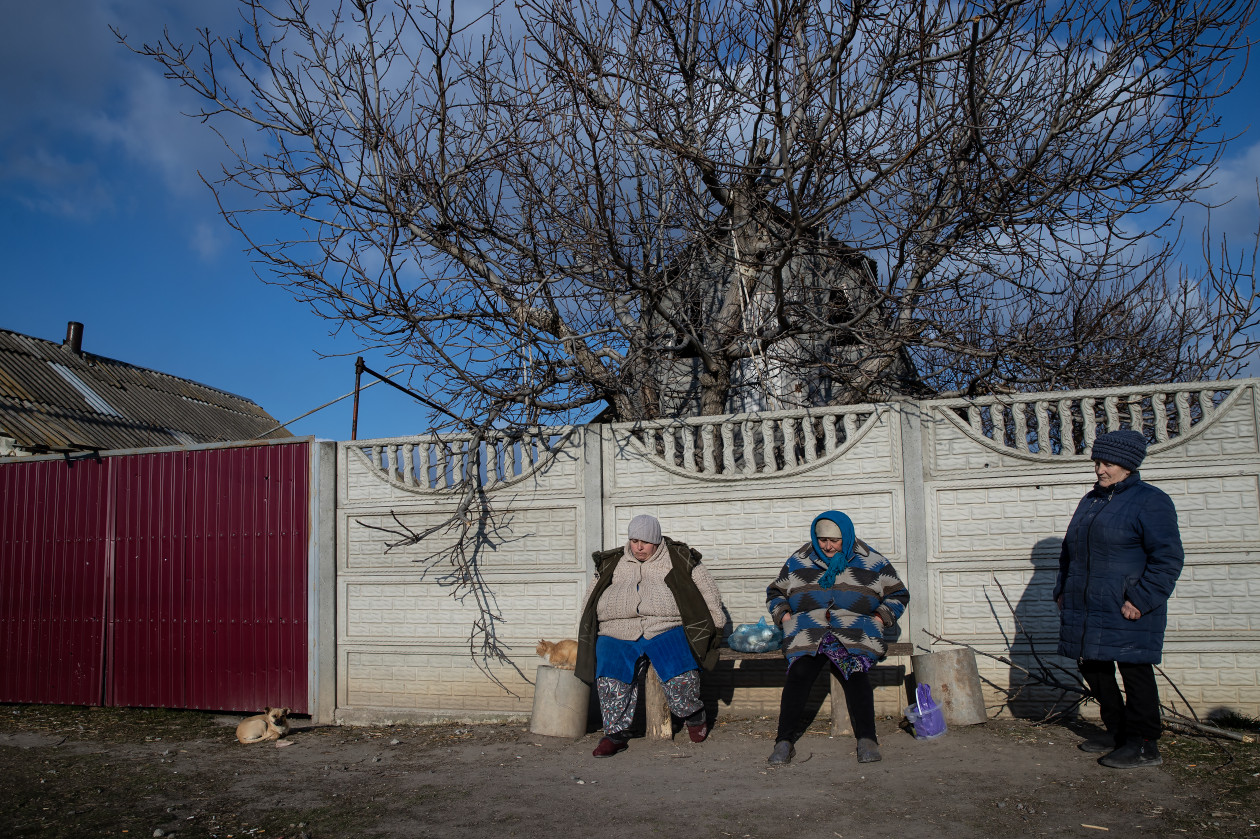
“I have really had enough of this war. Don’t ask me when it might end, ‘cause I am asking the same question.” He tells me that he also has relatives in Russia, but he has given up trying to talk to them. He won’t even mention Putin by name. He adds that he has never asked “to be saved by the Russians”, and neither has anyone in the village. “Show me one Nazi here! Of course, one can find scum everywhere…in Russia, and I am sure in your country, Hungary, as well. We probably have a few of those here as well, but that is our problem, and we will take care of that!”
Leonid also comes from a classically mixed background, proving the absurdity of Putin’s war “to save Russians”, which has actually strengthened Ukrainian national awareness.
“I was born in Russia. My mother was Ukrainian, and because of my father I used to consider myself Belorussian. Up until now. From now on I am Ukrainian.”
Due to the sensitivity of the topic, we do not display ads in this article.